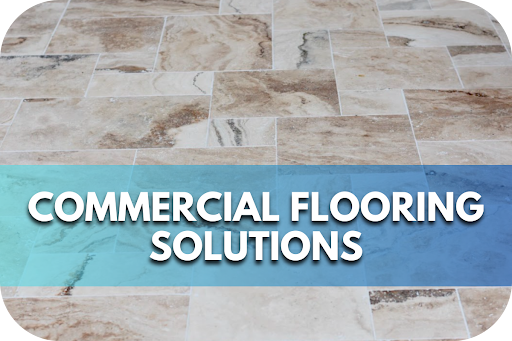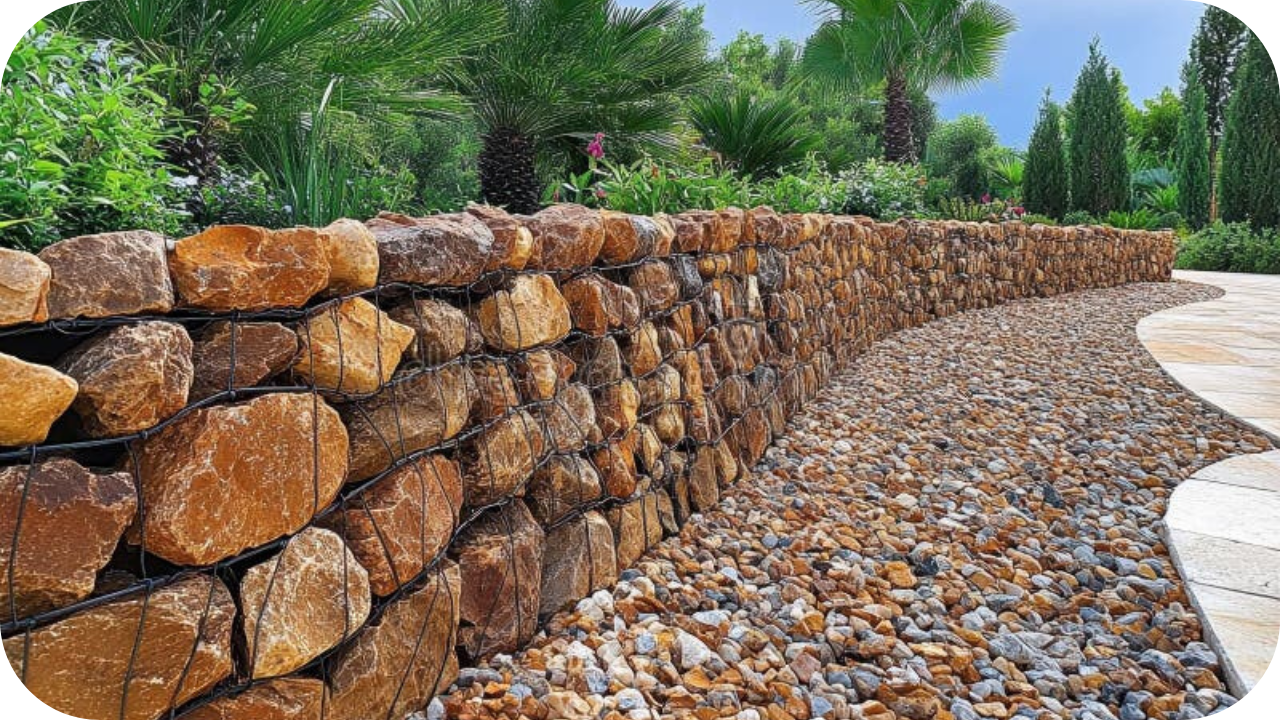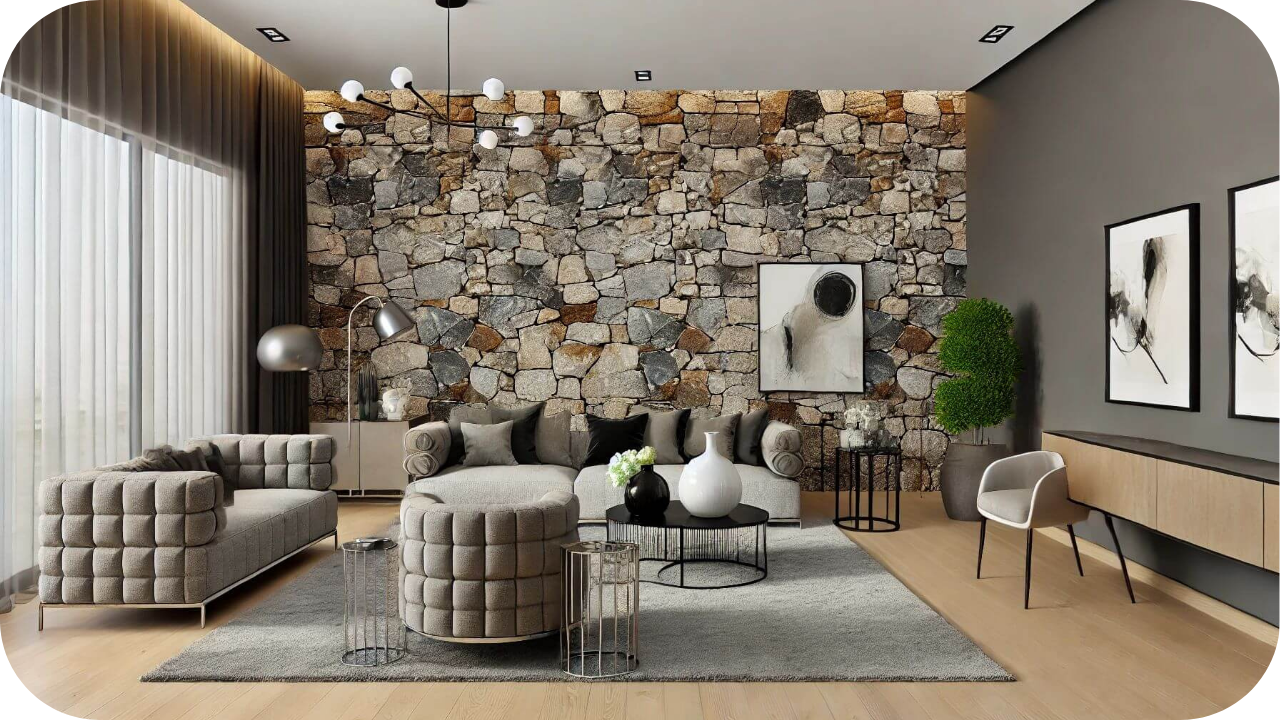
Regarding commercial spaces, flooring is crucial in setting the tone and creating a lasting impression.
Traditional flooring options may lack durability, aesthetics, or both, leaving business owners dissatisfied and constantly seeking replacements.
Stone flooring solutions offer a perfect blend of timeless beauty, unmatched resilience, and low-maintenance luxury, elevating your business to new heights of sophistication and practicality.
The Advantages of Stone Flooring in Commercial Spaces
Stone flooring offers many benefits for commercial spaces, making it a popular choice for businesses aiming to combine aesthetics with functionality. Here are the key advantages:
Unmatched Durability
Stone flooring is renowned for its exceptional durability, making it an ideal choice for high-traffic commercial areas. Its robust nature allows it to withstand significant wear and tear, ensuring a long-lasting flooring solution that can handle the demands of a busy environment without frequent replacements or repairs.
Aesthetic Appeal
Natural stone floors bring an elegant and timeless aesthetic to any commercial space. Available in various colours, patterns, and textures, stone flooring can enhance the visual appeal of offices, retail stores, and hospitality venues. The unique veining and natural variations in each stone tile add a touch of sophistication and luxury, creating an inviting atmosphere for clients and customers.
Low Maintenance
Stone floors are relatively easy to maintain compared to other flooring options. Regular sweeping and occasional mopping with a mild cleaner is typically sufficient to keep them looking pristine. Additionally, sealing the stone can enhance its resistance to stains and moisture, reducing maintenance efforts and costs.
Eco-Friendly and Sustainable
Choosing stone flooring contributes to an eco-friendly building strategy. Natural stone is a sustainable material quarried directly from the earth without synthetic processing. This reduces the environmental impact of your flooring choice, aligning with green building standards and promoting sustainability.
Enhanced Property Value
Investing in stone flooring can significantly enhance the value of a commercial property. Its durability and aesthetic appeal make it desirable for potential buyers or tenants, potentially leading to higher rental incomes or resale values. The stone’s timeless quality ensures it remains a valuable asset for years.
Types of Stone Flooring for Commercial Use
Choosing the right stone flooring for your commercial space can significantly enhance its aesthetic appeal and durability. Here are some of the top options to consider:
1. Granite
Granite is one of the most durable stones available, making it ideal for high-traffic areas such as hallways, kitchens, and commercial entrances. Its resistance to scratches, stains, and spills ensures longevity and minimal maintenance.
2. Marble
For a luxurious and elegant look, marble is a popular choice. It is available in various colours and patterns, adding a sophisticated touch to any commercial space. However, marble is porous and requires regular sealing to prevent stains and damage from acidic substances.
3. Limestone
Limestone offers a subtle, natural look with its soft, earthy tones. It is durable and can withstand heavy use, but it should be sealed to protect against moisture and staining. Limestone is perfect for bathrooms, living areas, and outdoor spaces.
4. Travertine
Travertine is characterised by its natural, pitted surface and comes in various finishes. It is durable and provides a classic, timeless appeal. However, it needs regular maintenance and sealing to prevent staining.
5. Bluestone
Bluestone is a versatile and durable stone, ideal for both indoor and outdoor use in commercial settings. Its deep blue-grey colour adds a unique aesthetic appeal, and its natural non-slip surface makes it perfect for high-traffic areas and outdoor walkways.
Bluestone is also resistant to weathering and can withstand various environmental conditions, making it a robust choice for commercial applications.
Enhancing Business Image and Brand Identity
Stone flooring enhances a business’s image and reinforces its brand identity. The flooring choice can communicate values such as sophistication, durability, and attention to detail, directly influencing how clients and customers perceive your business.
- Sophistication and Elegance: Installing stone flooring, particularly options like marble or travertine, instantly elevates the aesthetic appeal of your commercial space. This creates an environment of luxury and refinement, ideal for high-end boutiques, upscale hotels, and professional offices aiming to impress discerning clientele.
- Durability and Reliability: Stone flooring options such as granite and bluestone are known for their robustness and longevity. Choosing these materials can signal to clients that your business values quality and durability, traits that can build trust and convey reliability.
- Timeless Appeal: Stone flooring’s classic and timeless appeal ensures that your commercial space remains stylish and relevant, regardless of changing design trends. This can be particularly beneficial for businesses that want to maintain a consistent and enduring brand image.
- Unique Brand Character: Each type of stone, with its unique textures and patterns, can be customised to reflect your brand’s unique character. For instance, limestone’s warm, natural tones create a welcoming atmosphere, while marble’s unique veining provides a distinctive, high-end look.
Practical Considerations for Commercial Stone Flooring
When selecting stone flooring for commercial spaces, several practical considerations are essential to ensure optimal performance and longevity.
- Durability and Hardness: Different types of stone vary in hardness. Choosing a durable stone like granite or bluestone for high-traffic areas is crucial to withstand constant wear and tear. Softer stones like limestone may require more maintenance and are better suited for lower-traffic areas.
- Maintenance Requirements: To maintain its appearance and integrity, stone flooring generally requires regular maintenance, including sealing and polishing. Understanding the specific maintenance needs of the chosen stone type can help plan long-term upkeep and budgeting.
- Slip Resistance: Safety is a paramount concern in commercial settings. Certain stone finishes, such as polished marble, can be slippery when wet. Opting for textured or honed finishes can enhance slip resistance, reducing the risk of accidents.
- Cost: Stone flooring can be a significant investment. While materials like marble and granite can be expensive, they offer unmatched elegance and durability. It’s important to balance upfront costs with long-term benefits, considering factors like longevity and maintenance.
- Environmental Impact: Consider the environmental impact of sourcing and installing stone flooring. Some stones are more sustainable and environmentally friendly than others, and choosing locally sourced stones can reduce carbon footprints associated with transportation.
- Aesthetic Compatibility: Ensure the stone flooring complements the overall design and branding of the commercial space. The choice of colour, texture, and pattern should align with the business’s aesthetic vision and brand identity.
Cost and Investment Value
Investing in stone flooring for commercial spaces involves carefully considering both initial costs and long-term benefits. While the upfront cost of stone materials like marble, granite, and limestone can be higher than other flooring options, the long-term savings and added value make it a worthwhile investment.
- Initial Cost vs. Long-Term Savings: Stone flooring’s initial expense includes materials and professional installation costs. However, the stone’s exceptional durability requires less frequent replacement than other flooring types. Additionally, proper maintenance, like sealing and polishing, can extend the lifespan of stone floors, resulting in significant savings over time.
- Enhancing Property Value: Stone flooring is a premium feature that can substantially enhance the value of a commercial property. Its aesthetic appeal and durability are attractive to potential buyers or tenants, potentially leading to higher lease rates or sale prices.
- Cost-Effectiveness in the Long Run: Despite the higher initial investment, stone flooring is cost-effective in the long run. Its longevity reduces the need for frequent repairs or replacements. Moreover, stone’s low maintenance requirements and resistance to damage further contribute to long-term savings. Energy efficiency is another benefit; stone’s thermal properties can help reduce heating and cooling costs when integrated with underfloor heating systems.
Installation and Maintenance Tips
Proper installation and maintenance are crucial for maximising the lifespan and beauty of your stone flooring. Here’s how to do it right:
Installation Tips:
A flawless stone floor begins with meticulous installation. Follow these expert tips to ensure your stone flooring is installed to perfection:
- Subfloor Preparation: Ensure the subfloor is clean, level, and dry before installation. This is crucial for preventing future issues like uneven surfaces or cracking.
- Proper Adhesive: Use a high-quality adhesive suitable for the specific type of stone. Follow the manufacturer’s guidelines for mixing and application to ensure a strong bond.
- Correct Grouting: Select a grout that complements the stone and has the appropriate environmental properties. Sealing the grout will prevent moisture and stains from penetrating.
- Sealing: After installation, apply a penetrating sealer to the stone to protect against stains and moisture. The manufacturer recommends reapplying the sealer every few years.
Maintenance Tips:
Proper maintenance is essential to preserving the beauty and durability of your stone flooring. Follow these expert tips to keep your stone floors in top condition:
- Regular Cleaning: Use a pH-neutral cleaner specifically designed for natural stone. Avoid acidic or abrasive cleaners, as they can damage the surface. Sweep or vacuum regularly to remove dust and debris.
- Stain Prevention: Quickly clean spills to prevent staining. For stubborn stains, use a poultice designed for stone to draw out the stain without damaging the surface.
- Resealing: Periodically reseal the stone to maintain its protective layer. This will help preserve the stone’s appearance and prevent water and stain penetration.
- Avoid Heavy Impact: Place protective pads under heavy furniture and avoid dragging objects across the floor to prevent scratches and damage.
Conclusion
Stone flooring offers unparalleled durability, elegance, and cost-effectiveness for commercial spaces. Elevate your business with this timeless solution. Ready to transform your space? Contact us today for inquiries and consultations. Let us help you choose the perfect stone flooring for your business.
More To Explore

8 Advantages of Using Stone Grid Gabions in Your Landscape
Are you seeking a durable, cost-effective solution to elevate your landscape? Stone grid gabions might be the perfect choice! These versatile, eco-friendly structures offer a

10 Stunning Feature Wall Ideas Using Natural Stone
Looking to elevate your home with a stunning feature wall? Natural stone offers a timeless, elegant touch that can transform any room. From sleek marble


